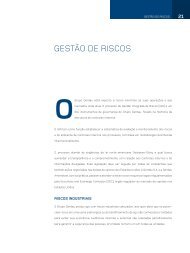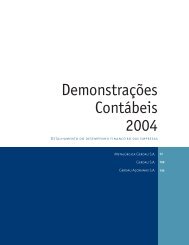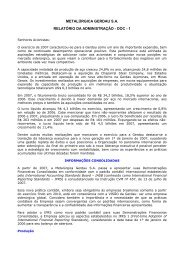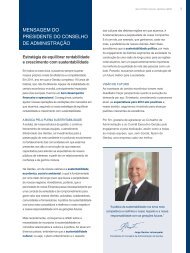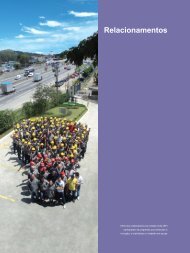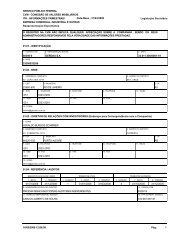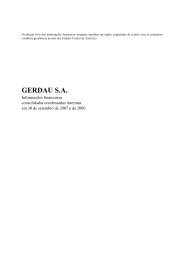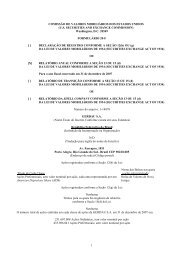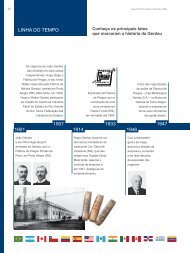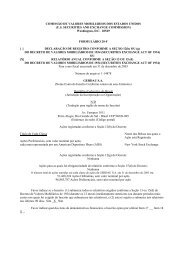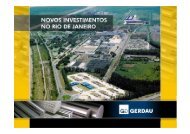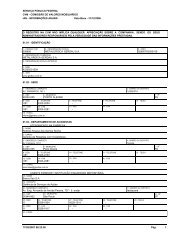Form 20-F - Gerdau
Form 20-F - Gerdau
Form 20-F - Gerdau
Create successful ePaper yourself
Turn your PDF publications into a flip-book with our unique Google optimized e-Paper software.
devaluation, social instability and other political, economic or diplomatic developments. “See Item 10 D – Exchange<br />
Controls”<br />
ITEM 4.<br />
COMPANY INFORMATION<br />
A. HISTORY AND DEVELOPMENT<br />
<strong>Gerdau</strong> S.A. is a Brazilian company that was incorporated on November 11, 1961. Its main executive office<br />
is located at Av. Farrapos, 1811, Porto Alegre RS – Brazil, with telephone number: 00-55 (51) 3323 <strong>20</strong>00.<br />
<strong>Gerdau</strong> began operating in 1901, with the Pontas de Paris nail factory in Porto Alegre, Brazil. In 1969, the<br />
company changed its name to Metalúrgica <strong>Gerdau</strong> S.A., and is today a holding company that controls <strong>Gerdau</strong> S.A. In<br />
103 years of activity, the <strong>Gerdau</strong> Group has made a seminal contribution to Brazilian industry.<br />
Important Events in the Development of the Company’s Business<br />
In order to compensate for the potential shortage of raw material immediately after the end of World War II,<br />
<strong>Gerdau</strong> acquired Siderúrgica Riograndense S.A., a steel producer also located in Porto Alegre. In February 1948, the<br />
<strong>Gerdau</strong> Group initiated its steel operations, which foreshadowed the successful mini-mill model of producing steel in<br />
electric arc furnaces (EAF), using steel scrap as its main raw material. The Company also adopted a regional sales<br />
strategy to ensure more competitive operating costs. Growth in its markets led the Company to install a second<br />
Riograndense unit in the city of Sapucaia do Sul (in the state of Rio Grande do Sul) in 1957, consolidating the<br />
Group’s vocation for producing steel. In 1962, steady growth in the production of nails led to the construction of a<br />
larger and more advanced factory in Passo Fundo (in the state of Rio Grande do Sul). <strong>Gerdau</strong> is currently the world’s<br />
largest nail manufacturer, with more than 1,000 items available to customers through 100,000 sales outlets.<br />
In 1967, the Company expanded into the state of São Paulo, in the Southeast of Brazil, purchasing Fábrica<br />
de Arames São Judas Tadeu, a producer of nails and wires. It was later renamed Comercial <strong>Gerdau</strong> and became the<br />
Brazilian distribution channel for the Company’s steel products, with 68 branches and 5 flat steel service centers<br />
strategically located throughout the country.<br />
In June 1969, <strong>Gerdau</strong> expanded into the Northeast of Brazil, producing steel at Siderúrgica Açonorte in the<br />
state of Pernambuco. In 1971 it began to build the Cosigua mill in Rio de Janeiro, initially as a joint venture with the<br />
German group, August Thyssen Huette. Eight years later, <strong>Gerdau</strong> became the major shareholder of Cosigua, which<br />
currently operates the largest mini-mill in Latin America. In December 1971, <strong>Gerdau</strong> acquired control of Siderúrgica<br />
Guaíra, a pioneer steel producer in the state of Paraná. It also established a new company, Seiva S.A. Florestas e<br />
Indústrias, to produce lumber on a sustainable basis for the furniture, cellulose and steel industries. Since then,<br />
<strong>Gerdau</strong> has expanded throughout Brazil with a series of acquisitions and new operations, currently owning 10 steel<br />
mills within the country.<br />
In addition to its industrial units and warehouses, <strong>Gerdau</strong> operates 11 rebar fabricating facilities in Brazil. In<br />
January <strong>20</strong>03, the Group became the major shareholder in the Dona Francisca hydroelectric plant (in the state of Rio<br />
Grande do Sul) taking a 51.8% stake in the overall capital of Dona Francisca Energética S.A.<br />
<strong>Gerdau</strong> began to expand internationally in 1980, with the acquisition of the Laisa mill in Uruguay,<br />
continuing in 1989 with the acquisition of the Canadian company, <strong>Gerdau</strong> Ameristeel Cambridge (formerly Courtice<br />
Steel), located in Cambridge, Ontario. In 1992, <strong>Gerdau</strong> acquired control of Indac and AZA, in Chile, merging these<br />
into a single company, <strong>Gerdau</strong> AZA, shortly afterwards. Over time, <strong>Gerdau</strong> increased its international presence by<br />
acquiring units in Argentina and most notably, in North America – <strong>Gerdau</strong> Ameristeel MRM Special Sections and<br />
Ameristeel. In October <strong>20</strong>02, <strong>Gerdau</strong> carried out a reverse takeover, merging its North American assets with those of<br />
the Canadian Co-Steel to create <strong>Gerdau</strong> Ameristeel, which is currently the second largest long steel producer in North<br />
America.<br />
After this merger between <strong>Gerdau</strong>’s North American assets and Co-Steel, the business names of the<br />
companies in that region were changed.<br />
On November 28, <strong>20</strong>03, <strong>Gerdau</strong> S.A. transferred its directly and indirectly controlled operations in Brazil to<br />
Açominas, which was renamed <strong>Gerdau</strong> Açominas S.A., albeit while maintaining its headquarters in Ouro Branco (in<br />
8



